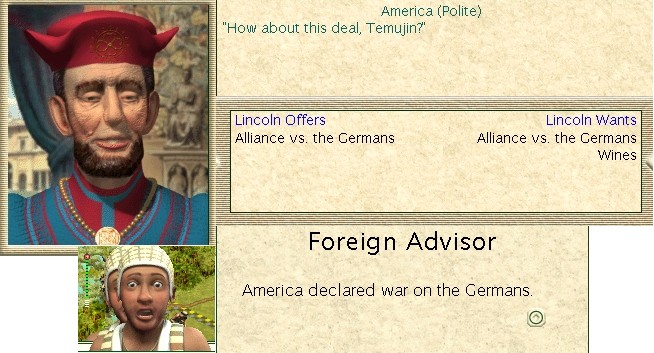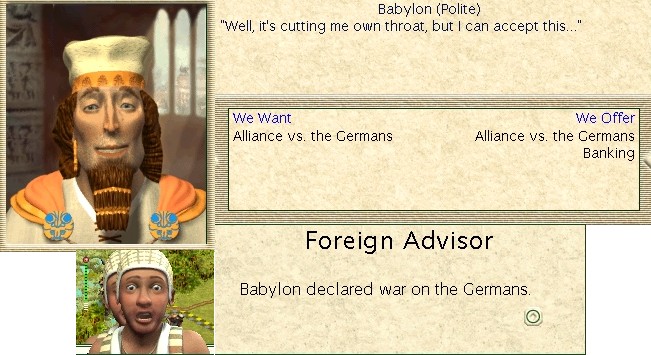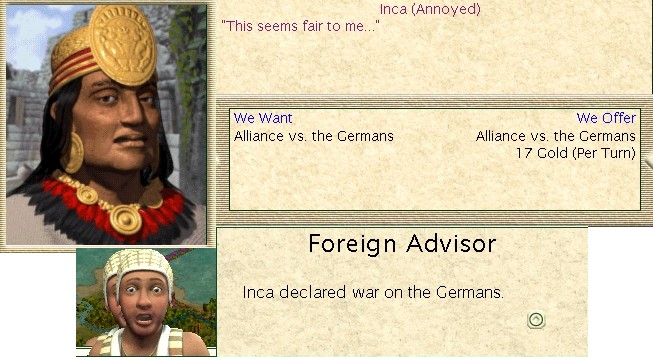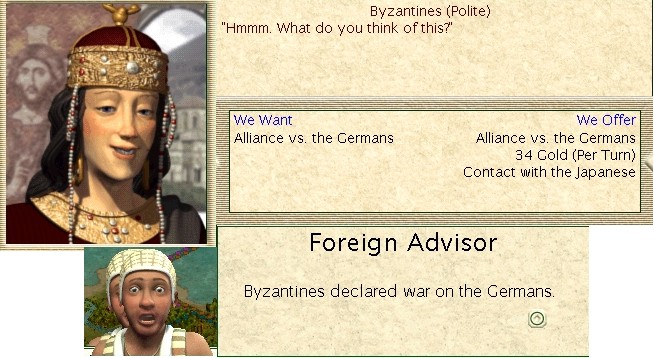Chapter Ten continued
Meanwhile, Subedei was regularly meeting the Khan and Chebe in the forbidden palace at Ta-tu. As the reports of the Russian collapse became more and more favourable, Subedei was authorised to begin shifting the mighty forces at his disposal to Yekaterinburg as a staging point for a future Chinese conflict. Thus Subedei was authorised to start planning this as a joint campaign with the Byzantines that was to see the Mongols and the Byzantines divide up the territory in the Sino-American peninsular. Obviously, this plan was a matter of the greatest secrecy, particularly since the relations with both the Chinese and the Americans had never previously had animosity amongst the parties. Clearly also this move would be a clear act of Mongolian aggression, and so the reaction of the rest of the world would need to be carefully monitored before any approval for the action could be given.
There was another reason for considering action against the Chinese. Yeh-lu’s informants had become aware of a Chinese plan for aggressive Chinese expansion that involved, as a preliminary, the development of another variant on the Keshik. Yet it had been rumoured that this variant would not only prove fleeter of foot, but also a better defender than the Keshik as well. The concept was certainly one to be feared, and so better a pre-emptive strike from the Mongols, then be the victim of the Chinese expansion moves to the south. Yeh-lu’s informants certainly had enough evidence of these developments underway, so as to justify the intended action.
Thus many troops were pulled back, and rebased to Yekaterinberg, just as would have been required in order to strike north. Most particularly, these troops were pulled back from the long new front with the Americans, and more pertinently, with the Germans. It is now well known that the Germans saw this repositioning of force in a very opportunistic way, and thus were encouraged to increase their militancy towards the Mongols.
A more in-depth analysis of the German psyche at the time revealed a deeply envious nation. In every other respect than land area and population, the mighty super-power Germany ruled over all she surveyed, but in these matters, the German republic fell short. However, and this was a very key however, the German territories had largely been acquired through organic means, and so represented strongly loyal well-developed cities with little waste to corruption. The Mongols, on the other hand, had a sprawling empire with a high level of lawlessness in the newly conquered territories of India, Greece and Russia. In fact the influence of the Mongols did not fully extend through these conquered territories, as the following period map demonstrates through the patchy coverage zones in these lands.

Chancellor Bismark had also steered the German people into an arms build up of their own, and with plentiful natural sources of the all important resources, there was not going to be an opportunity for Subedei to cut out the heart of the German resolve in the opening phases of the conflict. Perhaps the final straw for the German people was the loss of the fine Mongolian wines that had been so plentiful during the German participation in the Roman War, but now were nowhere to be found. This proved to be the catalyst for the simmering tensions to manifest themselves in a more violent way. Violent protest broke out in the streets of Berlin, with the people demanding more Mongolian wines.

Chancellor Bismark finally acted to appease his people. Pumped up with the German heritage that so massively overshadowed the Mongols’ own, and backed with the strength of arms of his growing military with both musket and knight divisions to spare, Bismark instructed his Mongolian ambassador to go and demand a continuance of the German supply of Mongolian wine.
If the German high command expected mere acquiescence from the Mongols, they had not done their research on the Khan very well. So angered was the Khan by this ridiculous and outrageous demand that he personally rose from his throne to seize the startled ambassador and manhandled him out of the palace. The German ambassador was left in no uncertain impression that any further sleights to the honour of the Mongols would result in the immediate execution of the messenger, and war upon the fools who authorised the outrage! On this occasion, the Khan was spared the need to declare himself.
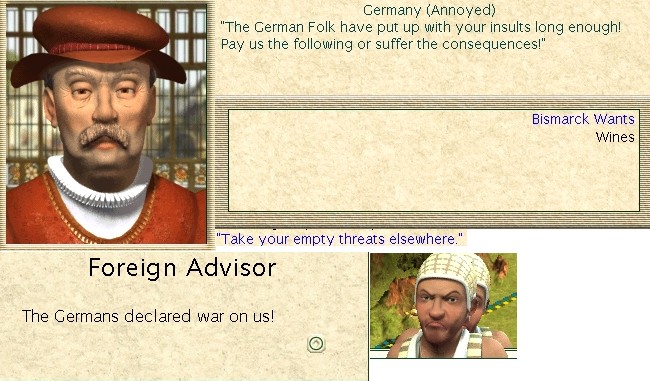
The Germans immediately backed their words with actions as a half division of knights appeared on the Great Dividing Range overlooking the town of Uliastay, as though they had been but waiting the command to go! With the bulk of his forces in Yekaterinburg, there was little Subedei could do to respond to the threat. The very real danger that the might of Germany represented to the Mongols was immediately realised by Chebe as well. And so, a new division of power was immediately decided upon. General Ereen was called back onto duty to control the forces in the south. He was to be charged with the defense of the border towns there, in particular Uliastay, and the clearing of the German towns lining the other side of the Great Dividing Range.
General Subedei would retain control of taskforce China, but instead of China, it would take the northern road through Khabarovsk to attack Nuremberg. Subedei also had several armies in the vicinity of Kazan, and he presented a strong case for opening a third front against the Germans based from this town.
General Chebe argued strongly for involving the neighbours of Germany in a mighty alliance to aid in the fall of this upstart nation. Given the Mongols’ ill preparedness to fight this war, the Khan did not raise objections. Chebe sought and received the assistance of the Babylonians, the Incans, the long term partner the Byzantines, and given their place on the Mongol hit list, perhaps surprisingly, the Americans into this conflict.
The Khan had reservations about the Babylonian deal and the price of the extended alliance with the Byzantines. In the case of the Babylonians, they had proven unreliable as a military ally in the past with a greater emphasis placed on the further construction of culture at the expense of building the necessary weapons of war. Furthermore, a lump sum payment by way of a technology left little ongoing incentive to keep the civilisation honest and involved in the conflict.
With the Byzantines, the Khan was starting to question their motives a little bit, especially given their stated like of conquest, however, given the Sun Tzu inspired quality of the forces that the Byzantines put into battle, it was a clearly worthwhile inclusion in the alliance.
Looking at the price of this new grand alliance, a casual observer could be excused for wondering what was the point of all this, after all the total cost of the alliance to the Mongols far exceeded the original German demand for wines. However, this would be a very shallow interpretation of the situation. Given the strength and growing power of the Germans, it had become inevitable for conflict between these two great nations. So this huge expense brought useful aid in weakening the might of Germany. Conceding to the German demand would have strengthened this enemy further still and granted the Mongols nothing!
As the Great War broke out, Subedei sent three battalions of Keshik over to the Nuremberg hill as an advanced guard. Further south, Subedei executed his plan by advancing Chagatai’s army and the second Keshik army across the Great Dividing Range, and into the territory of the German town of Dortmund. It was here that the special fortifications of the Germans became apparent. The construction of the Great Wall in their capital, Berlin, meant that even towns had defences like cities, and given that Berlin was several tiers of cities behind the frontlines, any offensive against the Germans was going to have to slog through truly well entrenched musket after musket. If the Germans had their way this war was going to be very bloody for the Mongols and their allies!
Ereen was in an even worse situation. With most of the troops that had been deployed around Uliastay, either on the way or already at Yekaterinberg, he had very little to hold off the impending attack. Two elite battalions of spears were able to garrison Uliastay, but with the impending doom of the German half division of knights to withstand, the likelihood of survival did not look great.
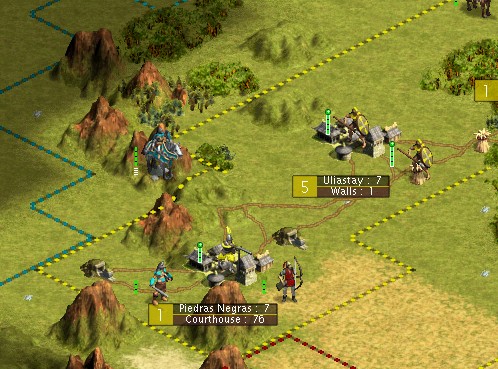
But just as things looked the grimmest, the most surprising alliance partner stepped forward to inflict damage upon the enemy. The Americans were technologically deficient, possessing weapons belonging to the Ancient Age, and yet by their numbers alone, and position within the German empire already en route to the final Russian city, they were positioned to strike. And although obsolete, the power of a sword battalion was still very effective when deployed against an unsuspecting modern unit. Such was the impact upon the Germans brought about by the presence of these American troops that the Germans used the remainder of their available resources buying in an alliance with Scandinavia not against the mighty Mongols, but against the backward Americans.
Just as one alliance partner was proving its worth, another was demonstrating that its priorities lay elsewhere. The Incans announced to the world the completion of the huge project they termed Copernicus’ Observatory. It was believed that this construction was to become a beacon for aspiring scientists, accelerating the pace of learning from within the Incan nation. For all of that it provided little comfort to the Khan in these trying early stages of the German War!
It was also during this time that the rapidly dwindling Russians sought to reassert their sovereignty. The Russians were desperate to found a further town after being reduced to a solitary city. In this far too late grab for space they deliberately sent settler caravans through the sovereign territory of the Incans. Of course there was no space to be had, but even more troubling for the Russians was that the Incans were not impressed with the Russian incursion, and so gave them an ultimatum – leave or declare war. The Russians, in a move that was clearly suicidal chose war!
It was then that the Germans unleashed their ruthless assault on the town of Uliastay. Ereen was quickly to learn that the power of the western knight was fully as convincing as the might of the Keshik, and what is more, even elite spear battalions could not deny them from their prise. It took the Germans just two battalions of these knights to destroy rhe defending battalions and seize control of the Mongol town.
Ereen was not going to take this German offense lying down. However, he still did not have the required units to crush the enemy, and after losing his first Keshik battalion to the defending German knight battalion he was forced to call off the attack, and wait for reinforcements.
The Germans had taken first blood, but they were yet to face the might of Subedei’s armies. Would the German resolve outlast the Mongolian alliance? Would the massive attrition of Keshiks expected against the huge numbers of German muskets break the Mongolian counterthrust? Would the German knights prove superior to the Mongolian Keshik? Only time would tell, but there could be no doubt about one thing – this was to be the greatest and bloodiest conflict to date, and by its end the world would be profoundly changed.












